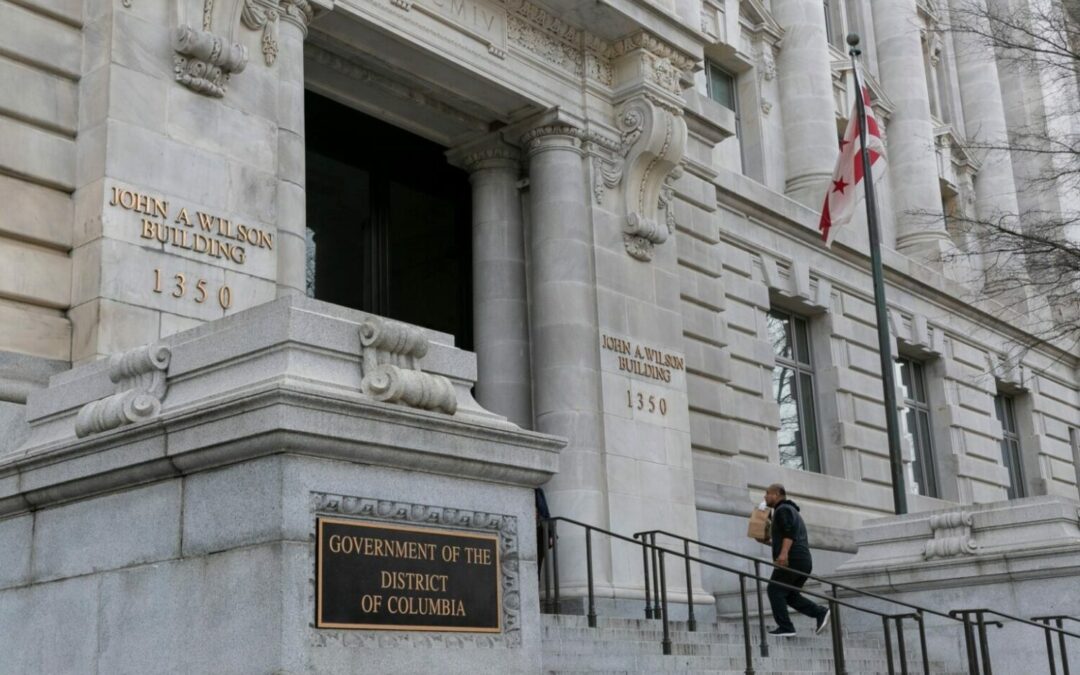Martin Austermuhle
October 22, 2021
A coalition of progressive groups in D.C. has launched a campaign to decriminalize all drugs and push towards a harm-reduction approach that would include supervised sites where people could use drugs.
The Decriminalize Poverty D.C. campaign was officially unveiled Thursday outside the Wilson Building, where activists from groups like the Drug Policy Alliance, HIPS, Black Lives Matter D.C., and the D.C. Center for the LGBT Community said they would push lawmakers to rethink how the city approaches drugs, drug use, and treatment.
“We want to see the D.C. Council remove criminal penalties for personal-use drug possession. We want to see a concerted effort to address collateral consequences related to drug convictions,” said Queen Adesuyi, the policy manager for the Drug Policy Alliance, in an interview with DCist/WAMU. “And we want to see a radical investment in actually building up our public health and harm-reduction infrastructure to protect drug-user health in the District.”
Adesuyi says the campaign seeks to connect the dots between longstanding drug prohibitions, racial disparities in law enforcement, overdoses, and health outcomes. And she says the campaign’s name cites poverty because of the ways the drug war historically impacted Black and low-income communities.
The campaign builds on past efforts to legalize the possession and personal use of marijuana, as well as last year’s voter-approved ballot initiative that made enforcing laws against “magic” mushrooms and other psychedelic drugs the police department’s lowest priority and a bill passed by the D.C. Council that decriminalized drug paraphernalia. And it comes as drug overdoses — most linked to the opioid epidemic — spiked across the region during the pandemic. In recent years, overdose deaths in D.C. have disproportionately impacted Black men.
While D.C. has increased efforts to fight opioid overdoses in part by expanding the availability of Naloxone, which can reverse an overdose, Adesuyi says the campaign wants to push the city to build upon past and current efforts to provide clean syringes to drug users.
“We want to see harm-reduction centers not only provide sterile drug supplies and connections to other support systems for people who need it, but we also want to see these centers provide a safe place for people to use safely and for people to have access to medical professionals on site who can address either overdose concerns or any other health emergency,” she said.
Local activists have been pushing for a supervised injection site since 2020, and a coalition of health providers in D.C. cite examples of such sites in Vancouver, Canada as a “promising practice.” While D.C. officials have been looking at the idea since at least 2017, no sites have yet come to pass. Last month, D.C. Attorney General Karl Racine led a coalition of attorneys general asking the U.S. Supreme Court to take up a case involving a safe-use site in Philadelphia that was told opening could violate federal drug laws; Racine told the court that clarity on the law was necessary for cities to move forward on “the promise of safe injection sites.”
But D.C. could face an additional challenge from Congress, where Republicans have in the past used the budget process to prohibit the city from funding needle-exchange programs and have for the last six years prohibited local lawmakers from legalizing the sale of marijuana. (Congressional Democrats are currently trying to lift that ban.)
Next month the council will hold its first hearing on a comprehensive bill to legalize marijuana sales, a measure that itself address concerns around who could benefit from the new industry, while also aiming to address past harms by proposing that existing marijuana-related offenses be expunged.
Adesuyi says activists are working with D.C. lawmakers to write legislation to implement the campaign’s goals, which also include expungement of past drug crimes and an expanded use of diversion programs for drug offenders.
“We’re really looking forward to D.C. Council and D.C. leadership to lead the country in terms of what the ideal pathway would be when we actually want to actualize what it means to say that drug use as a public health issue,” she said.

